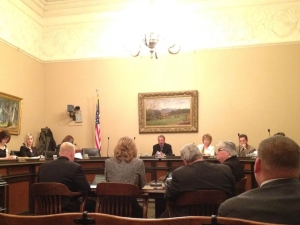MSW Students Advocate for Veterans’ Justice
May 07, 2012- Opinion
MSW student David Curry is all too familiar with the struggles veterans face once their service ends and they must return to civilian life.
Curry, a U.S. Marine with two tours of duty in Iraq behind him, worked as an outreach liaison for veterans at Saddleback College in Mission Viejo, Calif., assisting them with the transition to college life. So when his social welfare class was given the assignment to advocate on behalf of a piece of state or federal legislation for a semester-long project, the choice was clear.
Curry and 10 other USC School of Social Work students formed the Veterans Justice Advocacy Project to support California’s Assembly Bill 2611, which would authorize the creation of more veterans courts that would have the authority to move veterans accused of certain crimes to treatment centers instead of jail.
Created largely to address the needs of veterans returning home, veterans courts represent a new approach in the criminal justice system. Unlike traditional courtrooms, veterans courts offer alternatives to punishment that focus on recovery and rehabilitation.
And that’s exactly what Curry’s advocacy project supports. Its goal is to raise awareness of the legal needs of these wayward veterans whose mental illnesses caused by the traumas of combat, such as post-traumatic stress disorder or brain injuries, have led to criminal behavior.
In February, the advocacy group hosted a discussion on veterans courts at the school’s San Diego Academic Center. Students reached out to veterans court specialists in Southern California, including Orange County Superior Court Judge Wendy Lindley, who founded one of the first veterans courts in the country, and California Assemblywoman Betsy Butler, who introduced AB 2611.
The panel focused on the importance of veterans courts, which are modeled after drug and mental health courts that allow defendants to avoid prison in exchange for treatment.
Curry recently testified in Sacramento on behalf of AB 2611 in front of the California State Assembly Committee on Public Safety.
“We wanted to convey that through collecting and analyzing data, veterans courts can serve a prevention, as well as intervention, purpose,” Curry said. “It creates a further understanding of veterans’ criminality and reintegration barriers.”
He said he utilized research during his testimony to also emphasize the cost benefits of veterans courts, addressing concerns that such a bill would not be feasible in the current fiscal climate.
The bill received unanimous support from the Public Safety Committee and has been referred to the Committee on Veteran Affairs.
To reference the work of our faculty online, we ask that you directly quote their work where possible and attribute it to "FACULTY NAME, a professor in the USC Suzanne Dworak-Peck School of Social Work” (LINK: https://dworakpeck.usc.edu)
